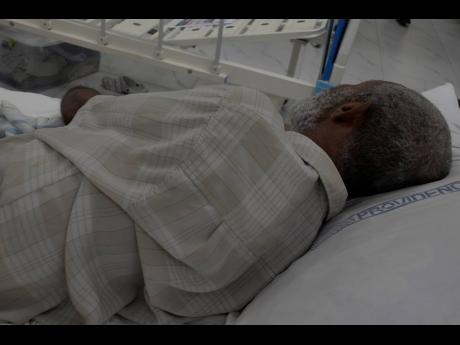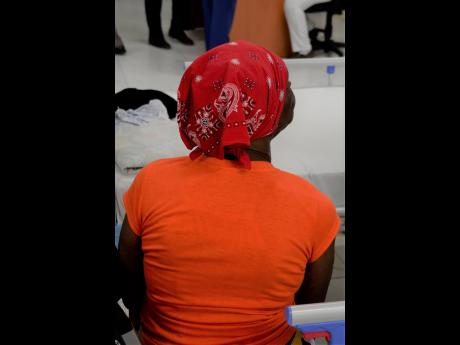Waiting in vain - Abandoned elderly spend years at infirmary with no word from next of kin
Dorrell Steele bore a sad look on her face as she lay in a bed at the Spanish Town Infirmary at Monk Street in the Old Capital on Friday.
Steele has been in the infirmary for two years and has never been visited by a relative.
She told The Sunday Gleaner that she was admitted to the nearby hospital after being cut during a scuffle with a relative who was trying to take her cellular phone from her. Doctors had been concerned about her high blood sugar levels.
Since then, she has been in the care of the state as no relative came to pick up the 70-year-old woman who is ailing from multiple complications, including scoliosis, and complaining of bedsores.
She spoke of terrible abuse at the hands of her relatives.
“One of them threatened to lock me in the house and burn it down. I have two children, but my son was killed, right in front of me. I have a daughter,” she said as she struggled to fight back tears.
She claims her relatives have now taken over her house.
Steele is one of 31 indigent persons (eight women and 23 men) who have been housed in a section of the infirmary, which is an extension of the Spanish Town Hospital, after being discharged. In most cases, they have not been picked up or acknowledged by the persons who they had listed as next of kin.
The infirmary is a partnership between the Ministry of Local Government and the Ministry of Health and Wellness and allows the latter to house patients who have recovered enough to be discharged but have nowhere to go.
According to Dwayne Francis, chief executive officer for the Spanish Town Hospital, persons listed as next of kin often refuse to acknowledge that the indigent persons are related to them.
“Our social work team would normally make contact between the different agencies to check where they are coming from with whatever information is on the books for us and try to get them home, integrated with the family,” Francis told The Sunday Gleaner.
“Most of the time when the social workers go to some of these areas there is either no land space there, nobody there willing to take the individual, and no house, or nobody willing to say that they know of the individual. So the persons are left in the hospital’s care.”
... ‘Getting down will get me nowhere’
Rudolph Numa was in high spirits as he sat on a chair along a corridor, engaging in animated conversation with other patients. He appeared to have been a man of means in his younger years and spoke quite eloquently when approached by The Sunday Gleaner.
Numa was admitted to hospital some years ago with a health condition but, when the time came for him to be discharged, no family member claimed the now 84-year-old man.
“I have lost track of time,” he told The Sunday Gleaner.
Numa said he has two sons, one living overseas and one who he said is a local businessman.
“I was a barrister, a businessman, a mechanic. I took care of my children,” Numa said. “I cannot afford to get down though, as that will get me nowhere. I have to think.”
Dwayne Francis, chief executive officer for the Spanish Town Hospital, told The Sunday Gleaner that residents often have no relatives coming to visit them at the infirmary to cheer them up or bring toiletries and other supplies.
“The policy that governs the Ministry of Health says that we have to discharge them into the care of someone, so the hospital doesn’t have any recourse when persons are left here. We have had incidents before where nursing homes have brought patients to the A and E (accident and emergency) and the patient would have received treatment, but at the time of seeking to see who is the relative or where the patient should go, there is no one to take the patient. The social workers have called the numbers on the files of the patients so much that they have stopped answering,” he said.
“The abandonment of persons at the hospitals is costing a lot. It is taking a heavy toll on the hospitals as there is a shortage of beds and persons who need treatment are being denied the proper care due to the lack of bed space.”
For Ruby McDonald, the experience has been different.
She was not abandoned, but has nowhere to go and knows of no living relative.
“I don’t know my father and my mother died when I was 12. I am from Ginger Ridge in Portland. I wasn’t being treated good, so I ran away on a market truck one morning and went to Coronation Market. I realised I could ‘trust’ goods from vendors so I started selling from then,” she said.
McDonald eventually started buying her goods and had been doing business and sleeping in the market until she became ill and was diagnosed with hypertension.
“I started going to clinic for my high blood pressure and one day the doctor tell me say me pressure too high and me can get a stroke. Them admit me, and when me fi leave me start cry ’cause me never have nowhere to go. I couldn’t go back a market,” she said.
The 81-year-old McDonald has lived at the infirmary for three years.





